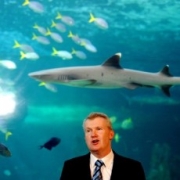THE FUTURE OF AUSTRALIA’S MARINE RESERVES
This month, Australia is on the brink of establishing the world’s largest network of marine reserves that will cover close to 900,000 square miles including vast zones that would restrict anglers from iconic fishing grounds in the Coral Sea. The science and regulatory processes used to design these reserves remains a very contentious issue and the debate still continues at the federal level. Approval of the reserves’ management plans by both the Lower (Representatives) and Upper (Senate) Houses of Parliament marks the final step before the reserves can be implemented.

Minister of Environment, Tony Burke. Commonwealth of Australia DSEWPC.
Resistance in Australian Parliament has been led by the Opposition who on June 3 filed a motion to disallow the management plans, arguing that the lack of public consultation with key stakeholders and that inadequate impact assessments were both rushed and insufficient to make a decision on such an important issue. In addition, the Opposition’s fisheries spokesman, Tasmanian Senator Richard Colbeck, stated that the creation and management of Australia’s marine reserves are lacking a sound scientific basis and that foreign NGOs have misled the public. “We want marine protected areas that are sensible, that don’t involve locking up huge swathes of the ocean, like the whole Coral Sea, just because the Pew Foundation thinks it’s a good idea and have run a campaign to Tony Burke,” he said.
In a split decision to approve the management plans just one day before the June 4th deadline, the final outcome came down to the vote of independents who voted in favor of marine reserves. Fortunately, there is still a chance that the Upper House will not approve the management plans by the June 25th deadline. Other actions are being taken including the introduction of the Environment Protection and Biodiversity Conservation Amendment (Making Marine Parks Accountable) Bill 2012 which would mandate that rigorous independent reviews of the science and regulatory practices are conducted. Currently in front of Parliament awaiting a vote, this bill could effectively disallow the proposed marine reserves and require that the design for these reserves starts anew- this time requiring much more thorough scientific justification.
The events that have unfolded this past week in Australia have further demonstrated how important, yet polarizing the management of marine resources can be. TBF agrees with many others that in Australia, which has demonstrated the ability to successfully and sustainably manage its marine resources, restricting access to important users such as anglers is not warranted and could cause detrimental impacts on the benefits generated from sportfishing. Restrictive marine zones do not protect against the more pressing threats like pollution or coral bleaching, but will displace many businesses with losses that some estimate could total in the billions of dollars. Already, many charter boats in Queensland are experiencing a decrease in business and one independent report predicts that as much as half of the Cairns charter boat fleet will be lost as a result of the marine closures. Australia is not only setting a bad precedent for the management of marine resources all over the world , but is also showing a general lack of transparency when making decisions that impact individuals, businesses, and the economy as a whole. If the management plans for the marine reserves are passed by Parliament, implementation will not take place until July of 2014 with the exception of the South-West Commonwealth Marine Reserve which will be implemented as soon as July of this year.




